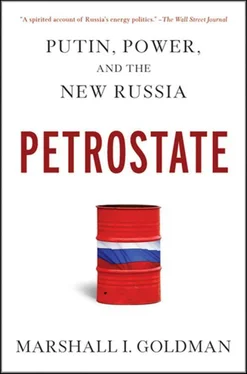True, Russia may no longer be a military world superpower, but there is little doubt that despite President Putin’s insistence that it is not one, Russia today is again a superpower. Only now it is an energy superpower.
Nor are Putin and those around him leaving this to chance. At first glance it may seem that much of this is just a matter of luck. But as we shall see, a more careful examination shows that this use of the country’s natural resources and the way they are exploited by what Putin has come to call “national champions” is all part of a carefully thought out grand strategy. Part of that strategy calls for the reimposition not only of state control but of state ownership (renationalization) of at least 50 percent plus one share of the stock of many of the petroleum, metal, and manufacturing companies that were privatized in the mid-1990s. Led by Rosneft where the state has always held majority ownership, companies like Yukos and Sibneft have been effectively renationalized. (How far-reaching this has been we will see in greater detail in Chapter 5, Table 5.4.) That explains why the share of crude oil production produced by the state-dominated companies in the year 2000, the year Putin took over as president, had fallen to as low as 10 percent. However, by 2007, just before he gave up the presidency, state-dominated companies’ share of crude oil production had risen again to close to 50 percent.
With its natural gas and oil pipelines that tie Europe to Russia like an umbilical cord, Russia has unchecked powers and influence that in a real sense exceed the military power and influence it had in the Cold War. No matter how many nuclear weapons it may have had, the USSR was prevented from using them by the knowledge that the United States had a comparable number and would counter the USSR’s use of them and vice versa. This was referred to as Mutually Assured Destruction (MAD), which meant no one country would dare attack the other. Now, however, if Russia decides to reduce or suspend the flow of gas through its pipeline to Ukraine and/or to Europe, there is virtually nothing to restrain it from doing so. There is no comparable Mutual Assured Restraint or MAR. It is also noteworthy that this gives Russia more economic clout with Europe than Saudi Arabia. Because the Saudis export relatively little natural gas, there are no consuming countries dependent on a Saudi pipeline for this commodity. This is an important strategic difference.
In the pages that follow, we will see how the ups and downs of the Russian energy sector provide a unique insight into what is taking place in the country as a whole. Our account should also help us understand some Russian paradoxes. Given that in the late 1970s and early 1980s, Russia (then part of the USSR) was the world’s largest producer of petroleum, why in 1991, with all that mineral wealth, did the Soviet Union collapse? What role, if any, did the CIA play in that collapse? Why wasn’t Russia an energy superpower then and why is it now? What are the implications of all this for Europe and the United States? How much of this is a matter of endowment and how much of it is due to a carefully designed policy? Who are the beneficiaries of Russia’s newfound wealth and power? Using the chess metaphor, what is Putin’s end game? These are some of the questions we will seek to address in what follows.
There is something about petroleum that is controversial and intriguing. And there is something about Russia that is mystifying and absorbing. When the two converge in a study of Russian petroleum, the result is bound to be tantalizing and engrossing, more like a fictional “who done it” than an accountant’s annual report. The role of oil and gas in Russia is a tale of discovery, intrigue, corruption, wealth, misguidance, greed, patronage, nepotism, and power—except for the absence of sex (and who knows?), a little something for everyone. Admittedly it is a story that often bears considerable similarity with those of other oil-producing countries. Yet as with all things Russian, it has many features that are unique to Russia. Most significantly, after a long period of failure to sustain itself as a military superpower, Russia has emerged—even if inadvertently—as a different breed of superpower, one whose power rests on economics and energy. How is it using that clout and what does this imply in the years ahead? We begin in the beginning with a look at how Russia emerged as the world’s largest producer of petroleum in 1898 and how what happened in the immediate years that followed has been repeated several times since.
1
Russia as an Early Energy Superpower
Although they were unaware of its ultimate potential at the time, seventeenth- and eighteenth-century residents of what was to become Baku knew about and used the region’s petroleum and natural gas. In fact, historians date the discovery of petroleum in the Baku area to a much earlier time. They point to the Parsees, a fire-worshipping cult that appeared centuries ago. 1These followers of Zoroaster built a temple seven miles outside Baku that served as a holy site until 1880. Its perpetual flames were probably fed by natural gases escaping from the abundant deposits under the temple. 2Even Marco Polo during his thirteenth-century travels noted that traders were very active in carrying oil-soaked sand to Baghdad.
Central Russian influence in Baku and the Caucasus in general came relatively late. After the fall of Constantinople, control of the Black Sea fell to the Turks, who kept the Russians out of the area for several centuries. On the other side of the Caucasus the Persians had control of the Caspian Sea. Ivan the Terrible pushed Moskovy’s influence down the river Volga to Astrakhan on the north shore of the Caspian Sea in the sixteenth century, but formal Russian control of Baku did not come until the conquest of the area by Peter the Great in 1723. Once in command, Peter sought to ship some of the region’s kerosene to St. Petersburg for possible use, but his advisers thought it was not worth the effort. 3It did not matter much since shortly thereafter, in 1735, the Persians regained Baku and impeded what little petroleum trade with the north there was. It was only in 1806 that the Russians recaptured Baku and in 1813 that they finally signed a peace treaty with Persia that authorized the transfer of control over most of the Caucasus from what is today Azerbaijan to Russia. 4
Before the arrival of the Russians, petroleum extraction was very primitive. For centuries indigenous petroleum traders had to extract the petroleum with rags and buckets. By using hand labor they were able to increase the depth of some of the pits but it was all quite unsophisticated. When the Russians came, they were able to improve the technology somewhat and production increased accordingly. In 1848 a Russian, A. F. Semenov, drilled the first relatively deep well, but even then the well was only sixty to ninety feet deep. 5
In 1821, after their reconquest of the area, the Russians set up a special franchising system for those who wanted to produce and sell petroleum. Given how few hours of light there are in St. Petersburg during the winter, by 1862 there was a good market in the north for kerosene made from Baku’s petroleum. 6The rights to drill and pump petroleum on a specific site were extended on a monopoly basis by the state for four-year periods. 7However, the lease could be revoked at the end of that time and there were no options for renewal. This deterred some investors and precluded more serious exploration and drilling activity, causing the leaseholders to extract as much as they could during the four years of their lease with little or no thought about maximizing the long-run output of the area. This system prevailed until January 1873 when a more efficient public auction system was introduced. 8As Table Intro.1 indicates, the changes facilitated a sharp increase in production. Although it was small to begin with, production doubled that year. The discovery of Baku’s first gusher in June 1873 facilitated this growth. 9
Читать дальше












